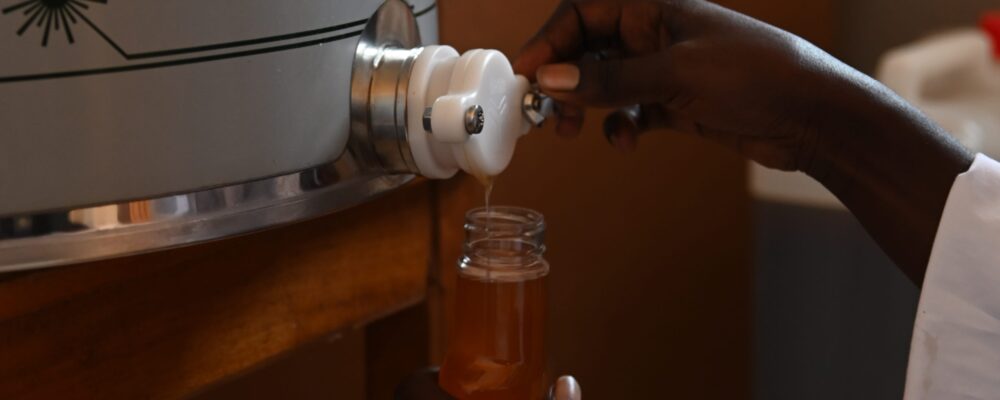
Systemic development of the apiculture value chain is at the heart of the work of the consortium of Woord en Daad, TRIAS Uganda and The Ugandan National Apiculture Development Organisation (TUNADO) – a member-based apex organisation for apiculture in Uganda with 90,000 members nationwide at various positions in the value chain.
Approximately 1.2 million people are involved in the apiculture sector in Uganda. Besides honey, the sector produces propolis, beeswax and bee venom for cosmetic, medicinal, food and other purposes. These products are mostly produced for the internal market and largely informal export predominantly to the neighbouring countries of Kenya, Democratic Republic of Congo, and South Sudan. Much of it finds its way onto the informal market or cross-border trade through traders that buy directly.
Value addition to beehive products requires special equipment and inputs such as wax melters for beeswax products, honey settling tanks and honey extractors. Entry points in value-adding activities for newcomers without assets or specialised skills are scarce. Beekeeping itself remains the most important avenue for these entrants, which makes the most sense in rural or peri-urban settings.
Beekeeping itself can be an attractive additional source of income for youth, as starting up a beekeeping business is typically low investment, does not require much capital or land, and the time costs to benefits ratio is relatively beneficial. Women may combine it with care responsibilities or other expected roles, especially in rural households. With local means at their disposal, an entrant can construct their own hives, set up an apiary, and with some basic knowledge about bees, one can start a self-sustaining beekeeping business with 10 colonies (15 hives) or more. What is important are colonies and not so much the number of hives.
Youth and women in apiculture
Youth and women commonly face similar challenges of lack of land ownership and (modern) basic beekeeping equipment. Young women, especially, need to negotiate with their own families or their husbands’ to be allowed to use land for their apiaries, which can be a stretch as not everyone likes the prospect of stinging bees in their backyards. No land, no apiary. The transient lives of young women in rural settings – implying that they move to another homestead upon marriage – also makes families reluctant to bestow land on their female household members.
One of the components of the Trees x Bees project is that 70% of the involved youth should be female. In the pre-selection phase of the project end of 2021, the numbers were 61% female and 39% male. Coffee farmers that are youthful females are especially hard to find. In this performance indicator, some regional differences seem to matter. One aspect seems to be the image of beekeeping as an activity for old men. Another is the origin of beekeeping in honey hunting, a practice in which men would often strip naked and hunt for honey from wild beehives in trees in the night. Furthermore, in many parts of Uganda, the south-west Uganda included, it is taboo for women to climb trees, and beehives used to be placed in trees to avoid harassment from the bees for passers-by.
Another factor that greatly impacts the performance of starting beekeepers, is knowledge about beekeeping, technical assistance, and development of skills. Beekeeping supposedly does not require much work. Still, knowing the basics of apiary management such as when to harvest, what to do when black ants creep into colonies and how to ensure that an empty hive attracts a bee colony in the first place, are essential to enjoy the sweet honey. When harvested prematurely, for example, the yield and quality of honey is substandard. Learning how and when to use adequate equipment and inputs plays an additional role to demystify beekeeping for youth and women. Imagine harvesting 100 beehives without a protective suit, with (woven reed) hives that need to be replaced every three years.
The changing and increasing effects of global climate change are a major impact on the apiculture sector. Rains that were previously as predictable as clockwork are more and more unpredictable, causing droughts or floods. Crops wither causing a decline in bee forage, and drought also impacts the production of honey. The shorter rains mean farmers must resort to herbicides to clear land and plant fast maturing crops. These herbicides are a real hazard to the environment. Additionally, increasing pesticide use on crops near beehives causes colonies to become weaker as bee health is affected. While these factors pose important challenges to the sector, integrating beekeeping into other agricultural practices, such as agroforestry, planting of multipurpose/high value tree species such as cashewnut, macademia, caliandra, avocado, mango, coffee, shea and others, can become a powerful solution.
Pollination services of bees are not yet widely recognised by farmers in Uganda but showing the importance of bee pollination services for agricultural crops could drive down the use of pesticides and promote the integration of beekeeping. In several of the model beekeeping farms, this integration of several crops with beekeeping is shown to be an effective way of increasing resilience of agribusiness income to climate change-related uncertainties and seasonality of agricultural income.
Shaping the apiculture value chain
The model value chain promoted by TUNADO, Woord en Daad and TRIAS, among others, features one stop rural centres that provide a grassroot market, inputs, equipment, technical assistance, and training for beekeepers. These important nodes are named Rural Transformation Centres (RTCs). An RTC is a member of TUNADO that is either a social enterprise, an NGO, or a business that can bulk and move larger quantities of beehive products. Typically, they have their own honey processing unit (production factory), wax processor and propolis packaging (manufacturing) in-house and they protect the quality of their honey through grading systems. Besides the bulking and value addition, the RTCs deal in essential inputs and equipment such as bee suits, beehives, and in some cases bee forage plants. Value addition mostly takes place within these RTCs or by other processing enterprises.
Young apiary professionals known as Apiary Masters are employed as extension workers that cater to the beekeepers connected to the RTCs. The RTCs each have their own mechanisms of guiding starting beekeepers, but they share common features. An extension worker is giving technical extension service, assistance, and monitors the apiaries periodically, according to a bee calendar; the beekeepers organise in groups to receive skills training, borrow equipment, or help each other with their apiaries. Training and know-how of beehive- and apiary management is critical to tap into the commercial potential of beekeeping. Adequate apiary management includes the maintenance of the apiary sites, planting and conserving good plants for forage, and water, as well as checking and regulating the colonized beehives in terms of colony health and pest control and timely harvest.
The network of auxiliary beekeepers, bee champions, RTCs and Apiary Masters is used for transferring skills, equipment loaning, support, and marketing. Beekeepers are organised in small groups that allow a more efficient distribution of material and skills training, as well as internal support between group members. In some cases, these groups register as farmers’ groups to be eligible for government or other support. This structure of groups and group leaders allows the beekeepers to become reachable for support by the RTC, government officials, or companies and other NGOs.
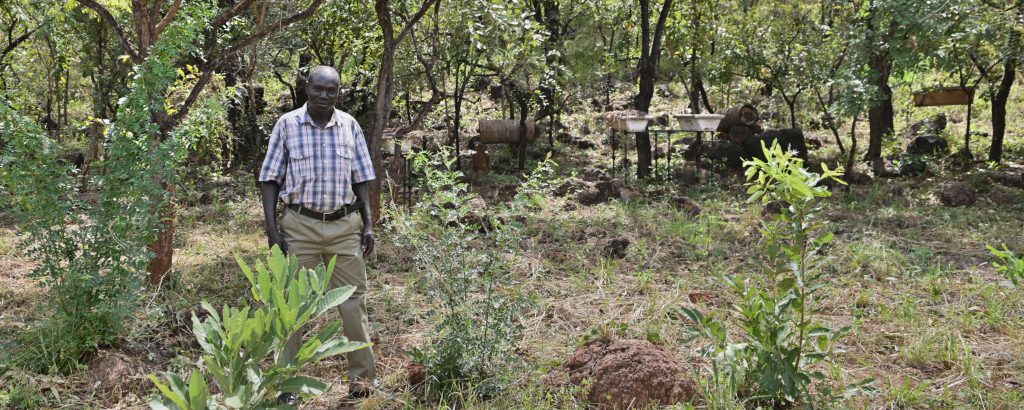
Mr.Mathias Abokalam Evergerlist, model beekeeper, near his apiary in Abim county, Karamoja
Aspects of inclusion
Beekeeping and other positions along the apiculture value chain require preconditions for new entrants to find viable employment opportunities. Beekeeping does not require much capital investment to begin, but it does require some capital, access to land, skills, and assets to become commercially viable. Value addition in this value chain hinges more heavily on simple but specialised equipment and clean working environments. Youth, as new entrants to the apiculture value chain, may face constraints in accessing some of these requirements, especially female youths.
First and foremost, access to land is required to set up an apiary. Youths, especially females, are not usually owners of land. This necessitates negotiations with land holders in the household, family, village, or local government to achieve access to land for the establishment of an apiary. Not a lot of land is needed for a small commercial apiary, but a piece of land that can be fenced off and maintained, relatively close to the homes and a water source, is a prerequisite for successful commercial beekeeping. Lack of other assets, such as beehives and essential equipment like protective gear and airtight buckets to preserve the honey after harvest, may also pose a barrier to youth that do not have start-up capital.
Not everywhere is beekeeping seen as an appropriate livelihood, or as a money-making business. Traditionally, men were the ones hunting for honey, climbing in trees, and men of age were the ones to keep bees for their honey. The image of a beekeeper is predominantly a male one, and an older one at that. In pastoralist areas with most of the population engaged in cattle-keeping, beekeeping may interfere with grazing lands of cattle when the interaction with neighbours is not optimal, or apiaries are not fenced. Additionally, beekeepers tend to prioritise other agricultural livelihoods over investing in their apiaries, given that beekeeping is often seen as a side business. These conceptions of beekeeping are addressed by providing youth and women role models of young male and female beekeepers with a business-minded approach. In part, extension workers fulfil this role, and in part model demonstration farms with integrated apiaries are used as the venue for trainings. In these trainings, special attention is given to Persons with Disabilities (PWDs), in terms of the outlook of the apiary for Persons with Visual Impairments, and training manuals for persons with Hearing impairment.
Directions from beekeeping for other flight paths
Agriculture is the largest sector in Uganda, employing most of its population (roughly 65%) – especially labour market entrants – about 40% of youth aged 15-24 are engaged in agriculture, forestry, or fishing. Despite its size, the sector contributes about 23% to the total GDP of Uganda and 31% of export. The small-scale and informal nature of agricultural and agro-industrial enterprises is said to cause this gap between GDP and employment contribution of agriculture. The contribution and productivity of these small-scale agriculturalists can be boosted by promoting systemic change in the value chains they are involved in, meaning changing the support structures, market linkages, infrastructure and production capacity of all actors involved in beehive products. The government of Uganda has stressed the importance of the agro-industrial value chains for employment and economic value creation, promoting innovation and productive transformation that links different value chain actors. This change can set preconditions for more decent work in agriculture for youth and women entering the job market. Some lessons can be learned from the efforts to transform the apiculture sector, as mentioned above:
- Providing examples of role models of integrative agribusinesses for youth and women and PwDs is a way to inspire business minded agriculture and more engagement from these groups. Integrative agriculture is a mitigation to climate change-related pressures on agricultural yields. Beekeeping can play a key role in this system in terms of smoothing cashflow and pollination services.
- Long term and comprehensive approach to promoting the value chain instead of hit-n-run practices of short term, narrow focus projects mostly subsidising equipment and distorting markets
- Opportunities differ for youth and women according to different positions in the value chain. Different assets and capital are necessary for primary production (land access, equipment, knowledge, market) than for value addition (specialised machinery, standardised processing, skills)
- The major barriers for youth employment in an inclusive value chain are sustainable land use rights, knowledge and skills, equipment and upfront investment due to lack of access to credit, and cultural or social perceptions of agricultural livelihoods.
- For the few people in the processing of honey and other bee products, one other major barrier is access to affordable finance to promptly buy the products from farmers during the harvest season. Many also lack the entrepreneurial skills and financial literacy to make bankable business proposals.
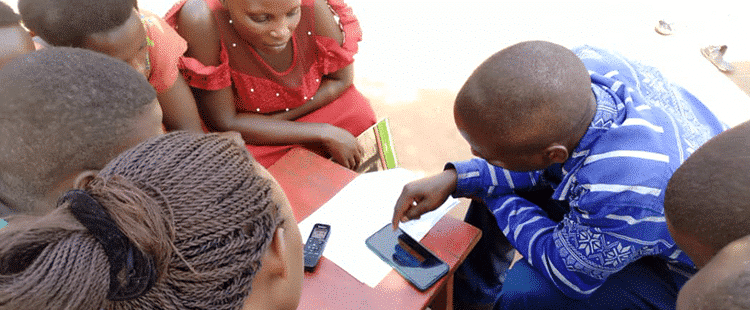
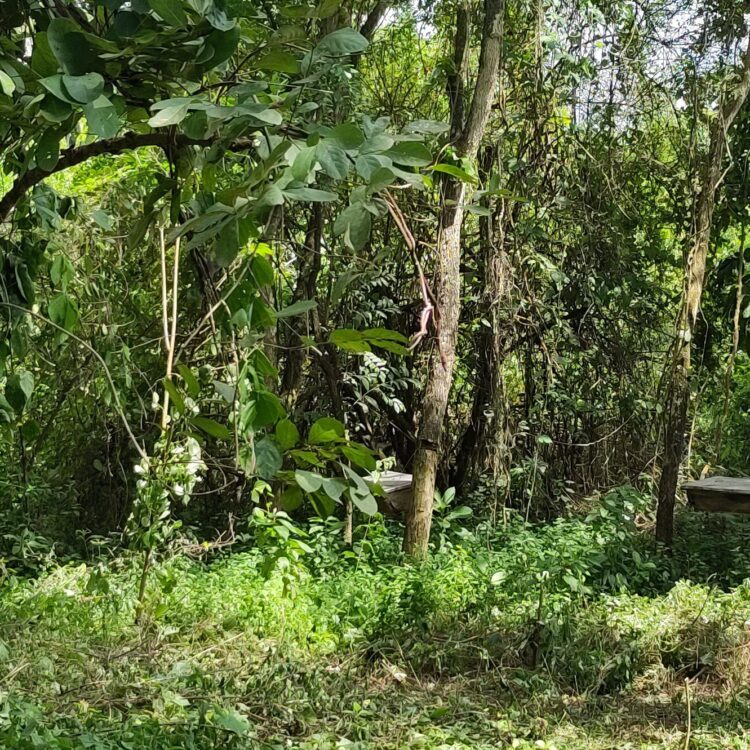

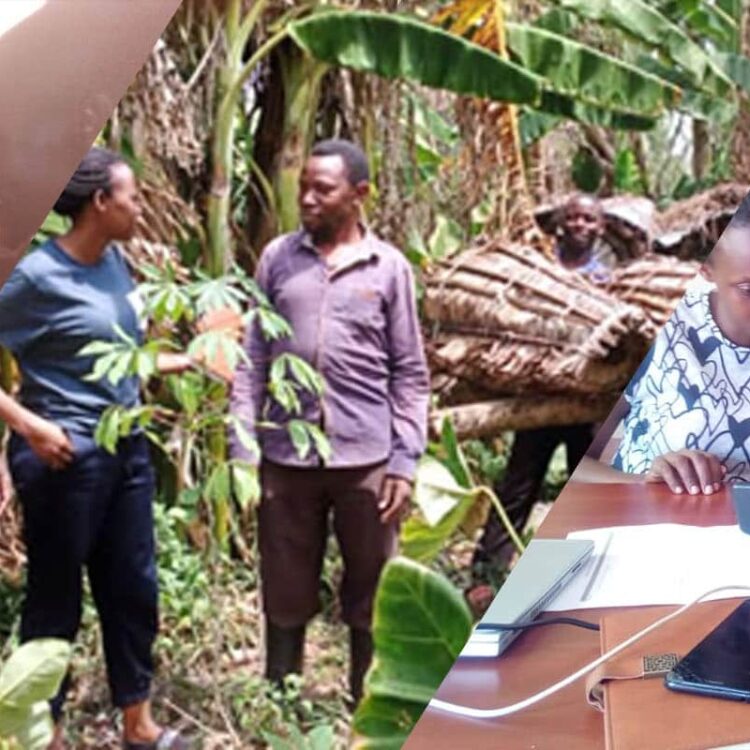
Well,thanks for the good information about beekeeping.
Am very interested in the project of beekeeping and plan this year to put up some give to start with.
Great stuff, good work here.
We are also100box start
My name is tumim am from ethiopia iam gonig to start beekeeping business this year i wish if i get some assistance form you thank you
Thank you for learning about the beekeeping in Uganda and the challenges for women, men and youth.
Like in bee colonies there is a lot of coöperative work to do!
Thank you the challenge funds we applied for another youth project a unfortunately we were not successful.
I like this story, surely we are in the same project we would love to get in touch with Woord en Daad, and TUNADO maybe we can have good patternship. https://goto.gg/41496.
I’m a professional bee keeper currently working with The Hive limited as a field technician, I’m glad about this discussion. In fact these are some of the challenges I face while in the field
very helpful information
thanks
i would like to get the data of honey bee production in the country of Uganda and should be broken down or quantified per regions.
Please can you establish linkages with my grouped farmers.
AM ABRAHAM ALLOTEY FROM GHANA AND INTO BEEKEEPING INNOVATION TECHNOLOGY DEVELOPMENT TO MAKE START UP AND EXPANSION OF BEEKEEPING COST TO BE VERY LOW FOR WOMEN AND THE YOUTH. I HAVE DEVELOPED OVER 60 INNOVATIONS IN BEEKEEPING. THE LATEST IS WHAT I CALLED SUPER HYBRID HIVE WHICH COMBINES THE ADVANTAGES OF THE TRADITIONAL, TRANSITIONAL (TOP BAR) AND MODERN (LANGSTROTH) HIVES WITH AN ADDITIONAL MECHANISM TO ATTRACT AND CAPTURE BEE PESTS .
+23324332609
great compilation
Thanks for the insightful article! I completely relate to everything shared, and I’d like to emphasize that land access for youth and women is still a major challenge in this sector